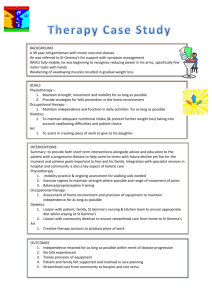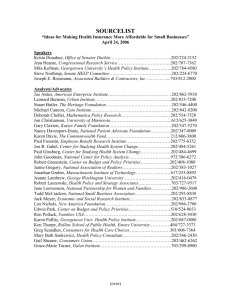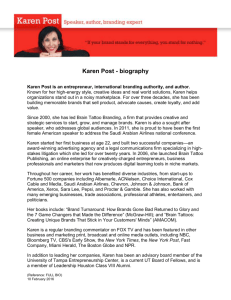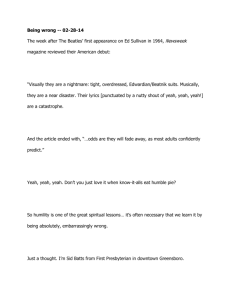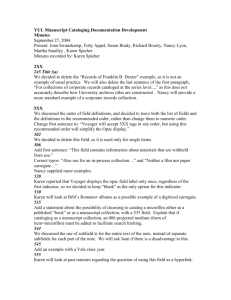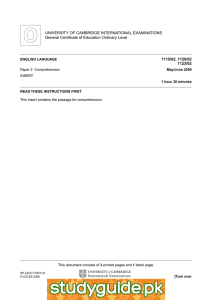slides - University of Bath
advertisement
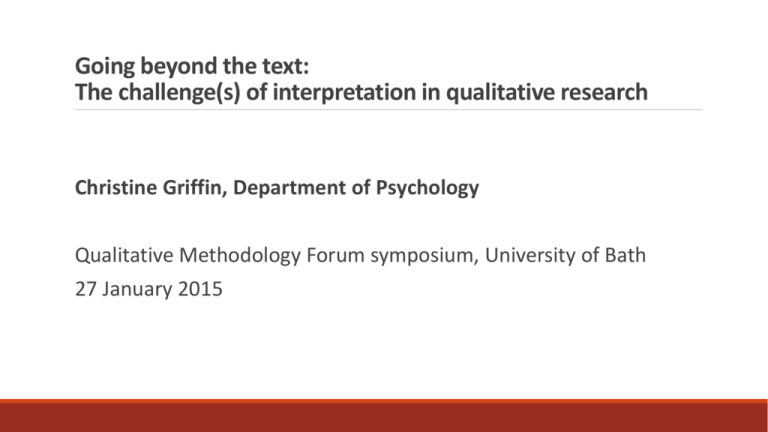
Going beyond the text: The challenge(s) of interpretation in qualitative research Christine Griffin, Department of Psychology Qualitative Methodology Forum symposium, University of Bath 27 January 2015 Interpretation and its challenges Interpretation = the construction of meaning There is something more to be said here What can (and can’t) count as ‘data’ Interpretation and the research process Drawing on examples from ‘Young consumers’ study Passing the “dead social scientist test” The distinction between ‘natural’ and ‘contrived’ data ‘Naturally occurring talk’ = “spoken language that is produced entirely independently of the actions of the researcher” (Potter, 1997, p.148) ‘Naturalistic records’ should replace research interviews as the “default technique” for the analysis of social interactions in qualitative psychology research (Potter and Hepburn, 2005) Aim = “to avoid active researcher involvement” (P & H, 2005) The importance of being there: ‘Emic’ and ‘Etic’ approaches Distinction between ‘Emic’ and ‘Etic’ analyses The impossibility of neutrality: Billig’s ‘Banal Nationalism’ (1995) “the analyst is not safely removed from the scope of investigation. We might imagine that we possess a cosmopolitan broadness of spirit. But, if nationalism is a wider ideology, whose familiar commonplaces catch us unawares, then this is too reassuring. We will not remain unaffected. If the thesis is correct, then nationalism has seeped into the corners of our consciousness; it is present in the very words we might try to use for analysis.” (1995, p.12). Examples from ESRC study of ‘Young consumers’ Research team (2001 – 2005): Christine Griffin (PI: Birmingham University) & Ann Phoenix (CI: Open University) RAs: Janine Hunter (Birmingham) & Rosaleen Croghan (Open University) Research questions: a) What does the relationship between consumption and identity mean for young people? b) How do parents and teenagers negotiate about money and ‘stuff’? Young consumers study: Research design Questionnaires to 1,354 young people aged 12/13 and 15/17 in 23 state schools in Birmingham, Milton Keynes & Oxford on things they had bought/been given recently and what these objects meant to them 60 semi-structured group discussions with 335 young people explored this issue in more depth Disposable cameras given to 28 young people & follow-up interviews about their favourite possessions Interviews with 20 parents and 16 teenage children Observational case studies with 11 groups of young people Two examples from one group discussion ‘Researcher-inspired conversations’ carried out in June 2002. State secondary school in outer suburb of Birmingham, primarily working class student population of diverse ethnicities, including white, South Asian and African Caribbean groups. First five years intake were single sex (girls only), with a relatively small coeducational 6th form. This group involved five young women aged 12 and 13 from Year 8 Two of the girls identified themselves as ‘Asian’ (Zaby and Reena), one as ‘mixed parentage’ (Karen), and two as ‘white’(Gemma and Becky). (1) The ‘hand cream moment’ (see handout) 431 433 434 435 436 437 438 439 440 441 CG: D’you think in your school or people your age there's a big range in the amount of money people have got to spend? Reena: Yeah (1) yeah Becky: Yeah Karen: Yeah (1) mm-mm CG: Even in your school? Zaby: Here y’are man (1) you need to cream your hands CG: Have some people got a lot more? Karen: Many (1) huh Zaby: Here y’are (1) I’ll give you some cream [inaudible] (laughter) Reena: Go on then (laughs) You wanted some more [basis?] so I’ll get it 442 CG: Some have got a lot more money than others? 443 Reena: They look a bit crusty 444 Karen: Yeah they have and they show it 445 Zaby: But there’s nothing wrong with having money people just think there is but it's not (1) it’s just cos your parents work more harder than some peoples 447 Karen: It's not even working harder it just depends on what job you've got 448 Reena: Yeah 449 Becky: 451 Gemma: (loud) Like (1) did you see Airport yesterday and that man who was always working? 453 Reena: Yeah, I watched it 454 Becky: 455 Gemma: He’s worked there for 20 years, and it's not even an expensive job it's just his dream 457 CG: Some people might not have much money but they've got their favourite job, they’ve got the job that they always wanted and I don’t think I watched it Break for hand cream (laughs) 457 CG: Break for hand cream (laughs) 458 Zaby: Yeah (1) I have to have cream in my bag (1) and deodorant 459 Reena: She’s always [inaudible] 460 Karen: Don’t be horrible 461 Zaby: You have to have cream and deodorant in your bag 462 Reena: Zaby is a bit [inaudible] 463 Karen: Yep (laughs) 464 CG: 466 Zaby: Beg 467 Gemma: Ask my dad 468 Karen: Ask mum (1) if she says no I go to my dad but I don't do it often cos it causes arguments 470 Reena: What I do (1) is just like (1) I wait (2) I'll get it eventually 471 Karen: Or I just mix some different clothes (1) or just look at it 472 Zaby: And think OK I’ll just put different clothes together Are there particular things that (1) say if you want to keep your style up and you haven't got enough money (1) what do you do? 473 Gemma: (loud, interrupts) I want to cut some too short jeans to make some shorts 474 Zaby: You need to get some proper cream 475 Gemma: That is proper cream (indignant) 476 Zaby: No it’s not 477 Karen: It’s Nivea cream that you need 478 (All talk at once) 479 Karen: You need a proper bottle 480 Gemma: I’ve got a proper bottle 481 Zaby: 482 Reena: I've got Nivea 483 Karen: Yeah (1) but shopping (1) it’s the shops you go in you see 484 Gemma: I don’t like shopping (1) it wears me out 485 Becky: Sorry Miss (2) shhhh [to other girls] 486 Zaby: 487 Gemma: [inaudible] 488 Zaby: I suppose they know what they want to get (1) but You need proper (1) like Nivea (1) that's like cheap your make I can’t stand people that go to one shop and then (2) The ‘flag-waving episode’ (see handout) England football team lost quarter final match against Brazil 5 days previously, putting England out of the 2002 World Cup. Throughout the interview, Zaby was twirling a small (approximately 1” by 0.5”) hand-made Brazil flag between her fingers on the table in front of her. Sitting on my immediate right, and two seats to the left of Zaby, Gemma was wearing a T-shirt bearing a large printed version of the England flag (ie. a red cross on a white ground) that entirely covered the front of the garment, including the sleeves. 498 499 500 501 502 503 504 505 506 507 CG: Has everybody (1) um been into the World Cup? Zaby: Yeah definitely (emphatic) (all talk at once) Karen: Even my mom's watching it Gemma: We watched the match Zaby: Brazil, Brazil (chanting in background) Karen: I need to watch my man Ronaldo* Gemma: We scored the first goal (loud) Zaby: Yeah but who scored two? Karen: Who lost (1) who lost (jumbled talking) 523 524 526 528 529 530 531 532 533 Gemma: (loud) England is the best. ENGL-A-A-ND (shouts) Zaby: If they're so good then how come they've only won the World Cup once and they're out? Gemma: Because injuries we’ve always had [all talk at once] all our people have had (inaudible) Zaby: Ssh CG: In the class as a whole though? Karen: Most people the majority support England [inaudible] Zaby: Most of the like most of the black girls in the school support er Brazil Reena: Brazil Zaby: All these lot reckon just cos you live in England you should support them Some final comments…. The importance of research engagement ‘Being there’ vs. ‘contaminating the data’ ‘Being there’ vs. ‘being dead’ Willig, C. (2012). Qualitative interpretation and analysis in psychology. Maidenhead, Berks: Open University Press.

